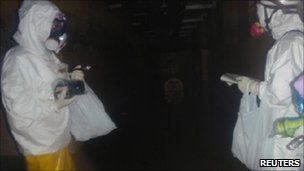Japan: ‘Ten years’ to decommission nuclear plant

Japanese reactor maker Toshiba says it could decommission the earthquake-damaged Fukushima nuclear power plant in about 10 years, a third quicker than the US Three Mile Island plant.
Radiation has been leaking from the Fukushima plant since a 9.0-magnitude quake and tsunami on 11 March.
Its operator said it would stop pumping radioactive water into the sea on Sunday, a day later than expected.
Meanwhile Banri Kaieda is set to become the first cabinet minister to visit.
Mr Kaieda has responsibility for all of Japan’s nuclear power stations and is scheduled to visit on Saturday.
He is expected to don a full protective suit for a tour inside the plant to inspect the work to stop radiation leaking from the site.
Radiation has seeped into tap water and farm produce, leading some countries to ban imports of Japanese produce and fish.
High levels of radiation have also been detected in the Pacific Ocean in the vicinity of the coastal plant.
The twin disasters on 11 March killed more than 12,800 people. Nearly 15,000 are listed as missing. Hundreds of thousands of people have been made homeless and a number of communities in Japan’s north-east have been devastated.
‘Unstable reactors’
Toshiba, one of two Japanese nuclear reactor makers, said it could decommission the Fukushima-Daiichi plant in about 10 years, Kyodo news agency reported.
That would be about two-thirds of the time taken to dismantle the Three Mile Island nuclear plant in the US after it suffered a partial reactor core meltdown in 1979.
The work would involve removing the fuel rods from their containers and the spent fuel rods from the storage pools from four of the plant’s reactors and demolishing facilities, Kyodo said.

Click to play
A deadly aftershock struck just before midnight on Thursday
However, chief cabinet secretary Yukio Edano said it was too soon to have a timetable for decommissioning.
“The Japanese government has always hoped to draft a detailed [decommissioning] roadmap,” he said on Friday.
“But the very fact that the reactors are unstable puts us in a situation where we have to continue to debate whether we can issue a responsible outlook.”
The plant’s operator, Tokyo Electric Power Co (Tepco), said it would continue an operation to dump 11,500 tonnes of low-level radioactive water from the plant into the sea until Sunday.
The operation had been expected to last until Saturday, but Tepco said the work was delayed by a powerful aftershock on Thursday that killed three people.
The work is designed to make room for highly radioactive water that leaked into the basement of the turbine building next to the plant’s No 2 reactor and an adjoining tunnel.
Workers at the plant have pumped in tonnes of water to cool the overheating reactors, making the water radioactive.
China has urged Japan to observe international law and adopt effective measures to protect the marine environment, amid concern over the discharge of some of the contaminated water into the Pacific Ocean.
South Korea has also complained of not being notified that radioactive water would be pumped into the ocean.
Japan on Saturday announced it would ban farmers from planting rice in any soil found to contain high levels of radioactive matter and provide compensation.
“We had to come up with a policy quickly because we are in planting season,” said Agriculture Minister Michihiko Kano.


Leave a Reply